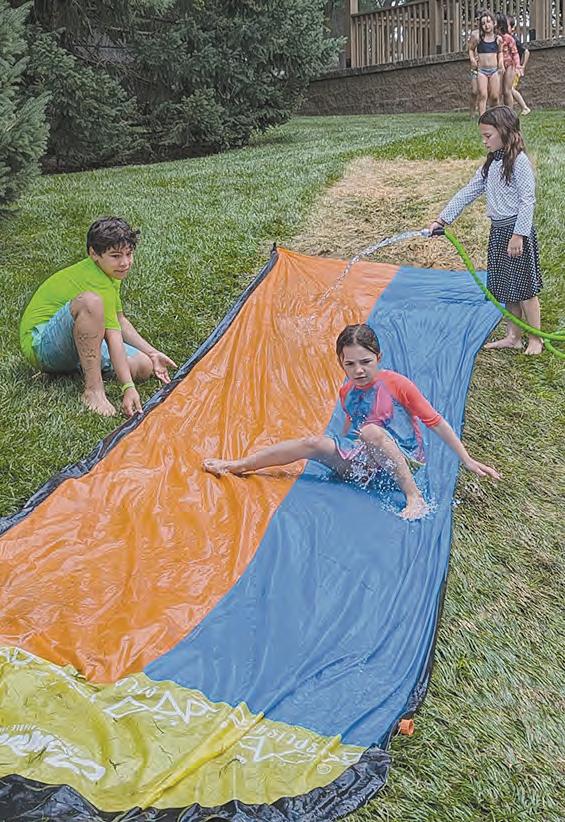







ANNETTE VAN
DE KAMP-WRIGHT Jewish Press, editor
The Lions of Judah are an international sisterhood of over 18,000 philanthropic women of all ages, who serve as leaders in their communities to strengthen the Jewish future. Every Lion plays a critical role in driving social justice, helping the vulnerable, and building flourishing Jewish communities around the world with high-impact philan-

Here is the update you’ve all been waiting for: new Star Deli dates and a
list of the specials! It was 2010 when Mike Silverman and Josh Gurock decided to bring the Lower East Side to Omaha. They’d been dreaming about it: the garlicky aromas and raucous atmosphere of the New York deli right in our own backyard. After extensive research and countless calls to their mothers, they amassed the authentic recipes needed for such an endeavor and Star Deli opened its doors. That first menu already included all See Star Deli page 2
thropic gifts through their Jewish Federations.
In 2024, Nancy Schlessinger said: “A unique experience of being a Lion is the worldwide sisterhood you gain when you join the Lion of Judah pride. Lions are generous, passionate and inspiring women who work toward repairing the world.”
That’s why, from time to time, these women are recognized for the work they do in their various communities. This past January, Nancy was honored with the Kipnis-Wilson
See Lion of Judah page 3
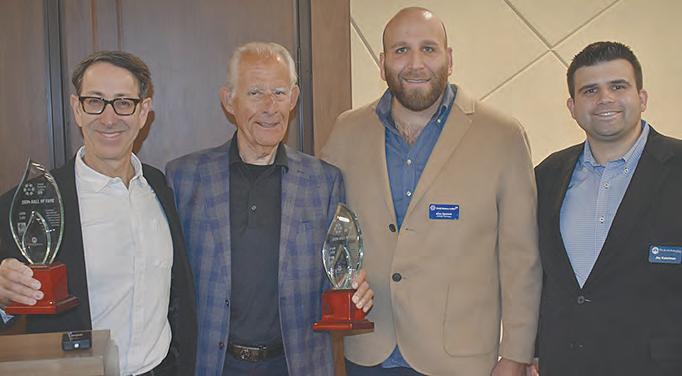
AMY BERNSTEIN SHIVVERS
JFO Foundation, Executive Director
ANNETTE VAN DE KAMPWRIGHT
Jewish Press, Editor
The Omaha community boasts a rich history of successful Jewish business leaders, whose determination, hard work, and vision have left an indelible mark on our city. To honor this legacy and ensure its continuity, a new endowment has been established to support and sustain the Jewish Business Leaders of Omaha (JBL) program.
Over the past few years, JBL has hosted a plethora of speakers, including Harley Schrager/Pacesetter Corp., Andy Ruback/Flood Communications, Jay Noddle/Noddle Companies, Rachel Jacobson/Film Streams, Steve Kaniewski/Valmont, David Gilinsky/Bergman Incentives, Amee Zetzman and Jeff Kavich/All Makes, John Lehr and Arnold Joffe/Grace Mayer Insurance Agency and most recently Tom Fellman and Howard Kooper/Broadmoor Development. JBL provides invaluable opportunities for professionals to meet, See Endowing JBL page 2
Continued from page 1
the staples, like matzah ball soup, pastrami and corned beef. Other menu items have changed and been added throughout the years. For ten years Friday’s deli was a community destination, where you could run into family friends, clergy and colleagues, all while enjoying excellent kosher dishes. Then, the pandemic came, and everything changed.
It would take until December 2024 before Star Deli finally welcomed the community back; currently, it is open every first and third Friday of the month. During the weeks that Star Deli isn’t open for in-house guests, community members can order take out, as long as they order online by the previous Tuesday.
“The Friday deli is one of those things that make Omaha so unique,” JFO CEO Bob Goldberg said. “It’s the perfect mix of good food and schmooze, and I absolutely love it. Kudos to the Rose Blumkin Jewish Home staff and all the volunteers who made this a reality again. Jewish Omaha is just not complete without Star Deli!”
“On Feb. 7, the special is fish and chips,” Chris Ulven said. “Then, during the Feb. 21 deli, we
will have an open-faced hot turkey sandwich. March 7 is shawarma, and the 21st we have a brisket sandwich. Chicken schnitzel is on the menu for April 4, followed by our famous latke Reuben on April 18, coinciding with Passover.
On May 2, we will have falafel, and on May 15 we’re offering an open-faced hot roast beef sandwich. Our next dates are June 6, when we have the PLT: pastrami, lettuce and tomato sandwich; June 20 is set aside for BBQ ribs.”
July sees a slight schedule change, because the first Friday happens to be July 4, so the dates that month are July 11 (chicken schnitzel) and July 25 (Reuben sandwich).
“Desserts will rotate between three or four things,” Chris added, “which are cookies, rugelach, brookie and maybe one other item. We want to be able to sell by the dozen as well. And: whitefish salad or chopped liver platters will be added as appetizers.”
All of that is good news for the entire community. For more information about Star Catering or to pre-order take-out from the Kosher Deli at the Rose Blumkin Jewish Home, please email Jennifer Addison at jad dison@rbjh.com
The award-winning B’NAI B’RITH BREADBREAKERS speaker program currently meets Wednesdays via Zoom from noon to 1 p.m. Please watch our email for specific information concerning its thought-provoking, informative list of speakers. To be placed on the email list, contact Breadbreakers chair at gary.javitch@gmail.com
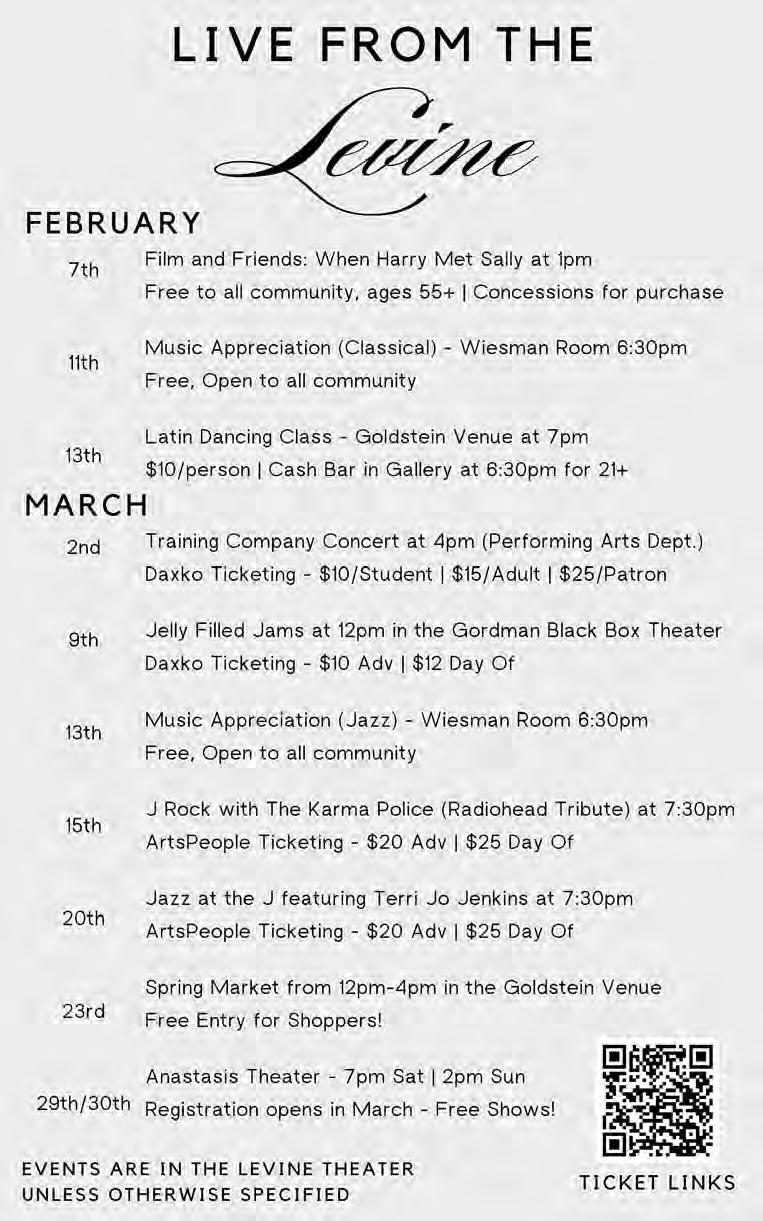
Continued from page 1 network, create meaningful connections, and grow their businesses or organizations.
“JBL has been wildly successful in bringing people together,” Alex Epstein said. “It provides a chance to learn about the companies and changemakers in our Jewish community, as well as their life and business lessons learned along the way. It became increasingly important that we create a mechanism to carry on this unique program for many years to come. We must find ways to expand the platform, so we can keep creating opportunities for our community.”
The program is personal for Alex:
“I wanted Jewish Business Leaders to be a program where we can honor the rich Jewish

Kicking off the endowment was Michael Staenberg; he has since been joined by several other (anonymous) donors:
“Jewish Business Leaders provides a great forum,” Michael said. “It’s important that we highlight the people who have made a true difference in Omaha, and I want to ensure it continues. It was great to see Howard and Tom be honored at the JBL breakfast in December.”
By becoming a part of JBL, participants contribute to a vibrant tradition of entrepreneurial excellence, building on the value of L’dor V’dor, from generation to generation. The establishment of an endowment ensures that professionals will continue to have a place to exchange ideas, experience, and learn from each other. Adding to the appeal, The Foundation’s incentive match in the fourth quarter of 2024 provided a 25% boost to all endowers’ gifts.
business history in this community,” Alex said. “It is important to learn about the present by bringing in business leaders in real time to share their stories and connect with the community, and build the future by creating a platform for young professional or current business leaders. Through JBL, we can connect with others in the community, do business together or find ways to connect while learning from the stories that each speaker has to share.”
He added: “Community is everything. All the speakers we have been fortunate to host had one thing in common: they cared about people, they connected, and they grew because those around them were growing.” If there is a program or agency you would like to ensure sticks around, please contact the Jewish Federation of Omaha Foundation. We can help make what’s important to you last forever.


Continued from page 1
Lion of Judah award at the International Lion of Judah Conference in Atlanta.
In addition to Nancy, Dana Kaufman, Jill Sideris, Kimberly Robinson, Stacey Rockman, Cindy Goldberg, as well as JFO staff members Jenn Tompkins and Rachel Ring represented Omaha.
“Attending the International Lion of Judah Conference was another reminder of what we are aiming to do for our own communities,” Nancy said.
“Bringing together 1,700 likeminded strong women, who hold the same Jewish values for our own communities as well as for Israel and all over the world, was extremely inspirational and powerful.”
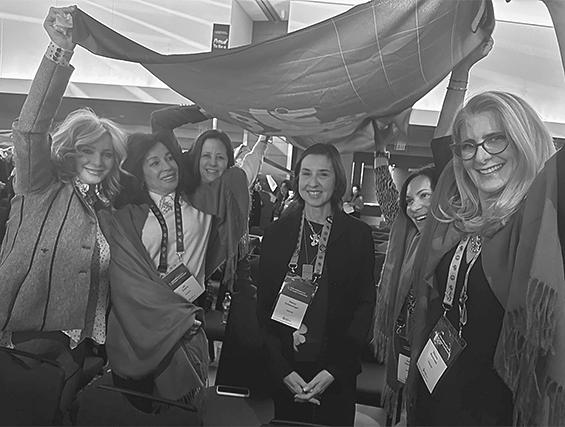
Those Lions came from no fewer than 90 different communities. While many came from American member federations, there were also participants from Israel, Guatemala, Spain, the United Kingdom and Mexico. Those in attendance took part in four plenaries and 12 educational forums.
“We heard from the President of Israel’s wife, Michal,” Nancy said, “who feels her job is to be a unifying force for her people and is doing so much important work in Israel. We heard from Rachel Goldberg-Polin, the mother of Hersh, and she shared with us how this group of Lions inspired her. We heard a beautiful performance from the Israeli singer, Eden Golan, whose Eurovision song brought so much controversy because it was titled after 10/7, that they made her change the name of the song during the competition. She is only 22 years old and spoke beautifully and seemed well beyond her years.”
Michal Herzog, the First Lady of the State of Israel, received the Ruth Bader Ginsberg Award at the conference. In the wake of the October 7 attack on Israel, Mrs. Herzog, an attorney, has been one of the leading voices in exposing the systematic sexual crimes perpetrated by Hamas. She believes that the use of sexual violence as a weapon of war should be condemned, and she plans to continue to lead this critical campaign until every voice is heard and every doubt as to the Hamas crimes against humanity has been eliminated.
“The lack of compassion towards our people following October 7 left me stunned and heartbroken,” said Jill Sideris. “I attended the Lion of Judah conference in search of peace, strength and guidance. What I found at the conference was that, and so much more! To be surrounded by 1,700 bright and beautiful souls from around the world, all of them experienc-
ing the same challenges and the same pain within their families and communities, was something that words truly cannot describe. We learned together, laughed and cried together. We shared ideas of how to make things better both individually and collectively. We inspired one another and strengthened our bonds.”
The conference also featured addresses by members of hostage families and those who lost loved ones since Oct. 7, communal leaders, U.S. officials and Israeli politicians — specifically Amos Hochstein, the White House’s special envoy. Given the rapidly developing news about a hostagerelease and cease-fire deal currently on the table, a mix of emotions rippled throughout the event, according to Dena Rashes, chair of the Lay Leadership Development Committee at JFNA. “You could feel the place starting to vibrate, in a way, with both hope and trepidation, as more and more news started to leak out,” Rashes said. Julie Platt, chair of JFNA’s board of trustees, echoed the sentiment. “We have the great good fortune of hearing from Amos Hochstein, and he gave us hope that we are on the brink, but honestly, none of us will believe it until it’s here. I think we’re all cautiously, cautiously, very optimistic,” Platt said. The conference also offered a rejuvenating pause amid a sequence of challenges the Jewish community has faced the past few years: the COVID-19 pandemic; Russia’s invasion of Ukraine; the Oct. 7 terror attacks in Israel and ensuing war in Gaza and rise in global antisemitism; and now the raging wildfires in Los Angeles, Platt said. “I think we all felt that and felt surrounded by love, and as 1,700 strong, felt the need for a shot in the arm, the rejuvenation, the re-inspiration to go back and do what will be needed in the year ahead,” she said. (Source: EJewishPhilanthropy)
The most important thing, Nancy said, was “just being together with so many women who care about their communities, giving of their time, talent and treasure, not just through dollars, but real caring and compassion. It was such a beautiful and meaningful experience. I look forward to attending the next ILOJC in two years and hope that more Omaha Lions would be interested in attending as well.”
Jill agreed: “I left the conference feeling hopeful, joyful, empowered and uplifted. I am prouder than ever of the strength and perseverance of our culture and religion, and that which we can accomplish together, even in the most difficult of times.”
B’nai Israel’s Monthly Speaker Series Service presents guest Thomas Fohner, Friday, Feb. 14, at 7:30 p.m. Service leader is Larry Blass. Everyone is always welcome at B’nai Israel!
One of my favorite verses is Psalm 145: 16: “You open your hand and satisfy the desires of every living thing.”



Thomas Fohner comes from a military family, and his childhood and adolescence were spent on several military bases in the United States. He obtained a BA in French from Furman University Greenville, SC, along with his teaching credentials, and is certified by the Nebraska Department of Education to teach in public schools. He also holds a Master of Divinity in Greek, Hebrew and Theology from Regent University, Virginia Beach, VA.
Thomas spent most of his professional life in France, where he and his wife both served as the pastoral couple in several small protestant churches in Normandy and the Paris region. In 2014 they returned to the United States to Omaha, NE, to be closer to their parents, children and grandchildren.
Thomas’ journey into Judaism started in France, where he met a businessman who was president of the synagogue association in Deauville, France.
“His friendship and kindness opened a door to a people and a culture that I had made affirmations about but scarcely understood,” Thomas said. “Indeed, my friend knew the Bible better than I did. As the French say, J’étais mordu. I was bitten by the bug, and I wanted to learn more.”
Thomas said: “In Judaism I learned about Av harachamim (Father of compassion). The compassion of God for Israel and for the world is repeated several times during Shabbat.
“Av harachamim is also present in the Christian Bible,” he continued. “In fact, this verse from a letter written to Christians in Corinth 2,000 years ago compelled me to volunteer in Israel in 2024. “Praise be to... the Father of compassion and the God of all comfort, who comforts us in all our troubles, so that we can comfort those in any trouble with the comfort we ourselves receive from God.” The author says that if we have received comfort from Av harachamim, we are to pass it on to others. Faith has this duty.
“At my congregation, Beth El Synagogue in Omaha, I heard about Sar-El, an organization that sends volunteers to Israel who work alongside members of the IDF. Through Sar-El, my efforts could relieve a soldier’s burden. That struck a sensitive chord in my heart. I knew what the trauma of war does to a family. The fog and fear of war entered my childhood heart through my father’s service during the American involvement in Vietnam. We tend to bury those memories, but faith has a duty.
“The happiest day of my life occurred when my Dad returned home from war. My Av harachamim returned and my heart rejoiced. For my part, that day was like the day that will be when the Divine Presence is restored in Jerusalem. What if today I could recreate that joy in the heart of a child or parent in Israel by helping a soldier return home? That was the voice of God compelling me to go to Israel. He is truly Av harachamim.”
Everyone is always welcome at B’nai Israel! We invite you to stay after services for our oneg. For information about the historic synagogue, please visit the website at www.cblhs.org or contact any of the synagogue’s board members: Renee Corcoran, Scott Friedman, Rick Katelman, Janie Kulakofsky, Howard Kutler, Carole and Wayne Lainof, Ann Moshman, Mary-Beth Muskin, Debbie Salomon and Sissy Silber. B’nai Israel is Handicap Accessible.















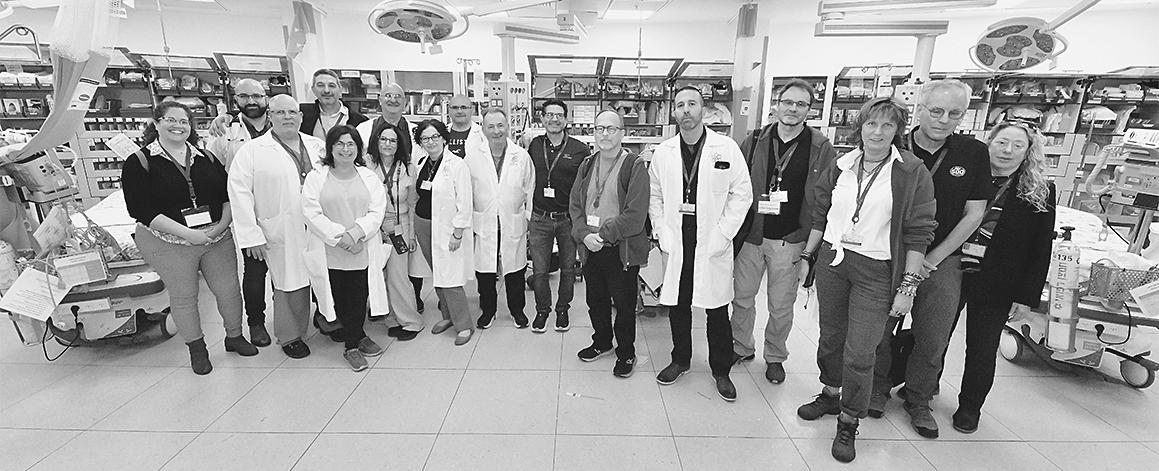
HILLEL KUTTLER
“Expand your spheres of influence,” read a slide projected on a wall by Louis Profeta, an emergency-medicine physician from Indianapolis during a talk he gave in the auditorium of the Galilee Medical Center on January 14.
That’s precisely what some of Profeta’s 13 colleagues in the audience, physicians from the central United States and Hungary, said they’d do once they were back home.
The 14 physicians had come to the Western Galilee on a weeklong medical mission organized by Partnership2Gether, a project of the Jewish Agency for Israel that strengthens ties between American and Israeli communities. P2G’s Central Area (which includes 16 communities in Illinois, Ohio, Indiana, Kentucky, Iowa, Nebraska and Texas, along with Budapest, Hungary) is linked to Israel’s Western Galilee, which includes the Mateh Asher region and Akko; the connection is known as Partnership2Gether Western Galilee.
Profeta’s message, he told an audience that included the hospital’s physicians and other staff, was this: “We should not be content enough just to be doctors, because we have so much [more] to offer.”
His comment resonated with fellow participants. Several explained later that they had plenty to bring back to their home communities by way of Israel advocacy.
While they’d come to learn — and did learn — from their Israeli colleagues in various specialties during the program’s five full days, they said they’d be returning better equipped as first-hand observers to speak about Israel’s reality during this challenging period. The mission occurred during a ceasefire in the war that the Lebanese terrorist group Hezbollah launched against Israel on Oct. 8, 2023, the day after Hamas’s massacre of approximately 1,200 Israelis near the Gaza Strip.
GMC is Israel’s northernmost hospital, sitting in Nahariya, just six miles from the country’s border with Lebanon. Moments after Profeta’s presentation, the P2G delegation walked
through the hospital’s basement to attend another talk, passing a ward that had been moved underground more than a year ago as a precaution against Hezbollah-launched missiles.
The delegation also came to learn about critical medical services they could provide during a future emergency that might arise in Israel.
“You come here and you really see how it is. Because I’ve been coming here so long, I feel connected to the Western Galilee region [and] to the hospital. My heart brought me here,” said Sandy Bidner, M.D., an orthopedist in Austin, Tex., who co-chairs P2G’s medical committee.
The committee’s Israeli co-chair, Aya Kagade, is the director of GMC’s international affairs department, which organized the mission’s program.
“The connection of the medical center to the P2G program is significant in showcasing a shared commitment to resilience, preparedness and solidarity,” Kagade said.
It was the second visit to Israel since the war began for Matt Schocket, M.D., an anesthesiologist and pain management physician, like Bidner from Austin.
“This is not a trip about being an active physician. This is a solidarity mission. My purpose for coming here is reporting back what I’ve seen and increase people’s connection to Israel,” he said. “This was an opportunity to come and learn and see — and take it back to my home community.”
The delegation had much to observe that morning during a comprehensive drill the hospital’s emergency department ran to test the response to a mass-casualty scenario involving 16 patients brought in following a crash between a bus and a car. The hospital’s top officials, CEO Prof. Masad Barhoum, M.D., and deputy director Tzvi Sheleg, M.D. — both of whom had addressed the P2G group — were among those attending the exercise.
“I can go back to my hospital and tell them how everyone See P2G Medical Mission page 7
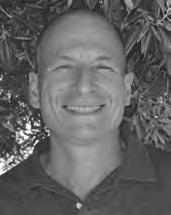
In May of 2023, United States Surgeon General Dr. Vivek Murthy released an advisory concerning “our epidemic of loneliness and isolation,” which he maintained “has been an underappreciated public health crisis.” Dr. Murthy said that a good way to tackle this crisis is to “prioritize building social connection,” and toward this end, in January a nationwide initiative called Project Gather is being rolled out. According to its website, “Project Gather believes that eating with others can bring joy, build interpersonal connections, and ultimately help solve the loneliness epidemic in the U.S affecting one out of every two Americans at any moment.” This past November, in an effort to promote the Project, The New York Times was invited to cover a pot-luck dinner, attended by Dr. Murthy and culinary stars such as Joan Nathan, Alice Waters, and José Andrés. Fortuitously, in November I too was given an opportunity to promote Project Gather, as my daughter Ruthie and her husband Nofar hosted some of their neighbors at a gathering in their Givatayam home.
For the November gathering in Givatayim (a city adjoining Tel Aviv from the East), Ruthie and Nofar decided to invite the people in their building around their own age (mid 30s), planning to include the building’s elderly residents a few weeks later in a Hanukah candle-lighting. There were 5 guests from three apartments: a couple without children, a couple with a child being babysat by one of their parents, and a widow with a 3-year-old to whom Ruthie gave a wireless baby monitor. The gathering was set for 8:30 p.m., with Ruthie and Nofar ordering pizza and the guests bringing wine. I asked Nofar why he initiated this gathering, and he said: “I wanted to get to know my neighbors.” I asked him: “But can’t you get to know your neighbors by happening upon them every once in a while?” His answer: “No.” And surely he is right. Because from a group of seven people who
had previously been only casual acquaintances, there ensued deep conversation that lasted for four hours.
Ruthie described what happened this way: “We talked like we were sitting with friends, talking about our kids, about the war, about serving in the reserves.” I asked about the young widow, whose husband had died on October 9, 2023 as a reserve soldier fighting terrorists in one of the kibbutzim. Ruthie said that the woman herself brought up the topic, saying: “It must be weird for you sitting here with me.”
Several people told her that they felt for her and that “it’s all around us now.” Then one of the men, Ori, said that his own father had died when Ori was relatively young, and he talked about his experiences and feelings. In short, Ruthie said: “We went very deep.”
The Project Gather event in Givatayim was a fabulous success. Amit, one of the women in attendance, even wrote her thanks on the group’s whatsapp chat that very night, though it was almost 1 a.m.: “Ruthie and Nofar, you sweet people, a giant thanks for hosting—what a wonderful time together.” From a single shared meal together, a group of relative strangers had become friends.
If you need further inspiration to participate in Project Gather, take a look at Recipes for Connection, a colorful, whimsical booklet produced by Dr. Murthy’s office. In addition to other “gathering” stories, the booklet offers pointers such as “ingredients for any gathering,” “making the invite,” “examples of real-life invitations,” and “strategies for easing gathering anxieties.” And if you need an additional authority other than the Surgeon General as to the importance of “gatherings,” the Talmud (Shabbat 127a) lists “hospitality toward guests” as one of six precepts where “a person enjoys the fruits in this world while the principal reward remains intact for that person in the world to come.”
Teddy Weinberger, Ph.D., made aliyah with his wife, former Omahan Sarah Jane Ross, and their five children, Nathan, Rebecca, Ruthie, Ezra, and Elie, all of whom are veterans of the Israeli Defense Forces; Weinberger can be reached at weinross@gmail.com.
ANNETTE VAN DE KAMP-WRIGHT Jewish Press Editor

An enthusiastic delegation of young Jewish leaders represented Omaha at the recent Jewish Leadership Summit, which took place throughout Martin Luther King weekend in New York City. The international gathering brought together 700 young Jewish leaders, representing 100 cities and 30 countries. Omaha representatives participated in expert workshops and think tank sessions tackling pressing issues; they were accompanied by Chabad of Nebraska’s Rabbi Eli and Mushka Tenenbaum.
“I recently attended the “Encounter” Crown Heights Shabbaton with Chabad,” Lillian Cohen said. “I was inspired to be surrounded by 750 other young Jewish professionals in New York. It was amazing to have the opportunity to meet and connect with them.”
Included in the topics at hand were rising antisemitism, when participants discussed strategies to combat antisemitism in person, online, and in the workplace. They also addressed dating and relationships through a Jewish lens, and how to navigate modern challenges in building meaningful long-term relationships and marriage. Another important topic was mental health. Attendants held a conversation about how to provide resources, how to manage stress, anxiety, loneliness and how to maintain emotional well-being.
Of course, the Middle East and current political situation also had to be addressed, and participants learned how to facilitate conversations on peace and resilience amidst today’s events. Finally, they talked about Judaism’s Relevance in the Modern World, and explored how Jewish values, spirituality and traditions apply and thrive in today’s society.
“We were able to hear from many speakers,” Lillian said, “with the highlight being senior vice president of Disney, Jim Kapenstien, who talked about his experience of being Shabbat-observant while having such a demanding job. Rabbi Eli’s family graciously hosted us for Shabbat dinner, and we had the most delicious buffets of kosher food throughout the weekend. When Shabbat was over, there was a beautiful havdalah ceremony and dance party. It was an experience full of pride and joy for our yiddishkeit and served as a reminder of how meaningful it is to be Jewish.”
In today’s climate, young Jewish professionals face unique challenges—from balancing career ambitions with cultural identity to dealing with increasing antisemitism and seeking See Jewish Encounter page 7

SARAH KELEN
Congregation B’nai Jeshurun/ South Street Temple President
In 2024, Congregation B’nai Jeshurun, Lincoln’s South Street Temple worked with the Jewish Federation of Omaha Foundation to establish two endowed funds that demonstrate our values and celebrate our identity. The Temple also joined the Life & Legacy program to offer Temple members and supporters an easy way to make legacy gifts that will last for generations. In establishing these different endowments, the Temple has taken significant steps to secure its future and amplify its mission for generations to come.
Last year the Temple received a generous bequest from an anonymous donor who was deeply committed to social action and was particularly proud of the Temple’s longstanding partnership with the weekend lunch program at the F Street Rec Center. In conversation with this donor’s loved ones, the Temple Board decided to establish an endowment through the Jewish Federation of Omaha Foundation dedicated toward supporting the Temple’s social justice activities in perpetuity. The Temple’s ongoing social justice partnerships include: We Can Do This!, the non-profit that organizes the weekend lunch program; Clinic With a Heart, a non-profit Lincoln medical clinicthat serves the uninsured and underinsured; Justice in Action, an interfaith social justice advocacy organization in Lincoln and Lancaster County; and Star City Pride.
Additionally, in conversation with members of the Friend/Adland family, the Temple Board chose to take advantage of the Jewish Federation of Omaha Foundation’s fourth quarter incentive
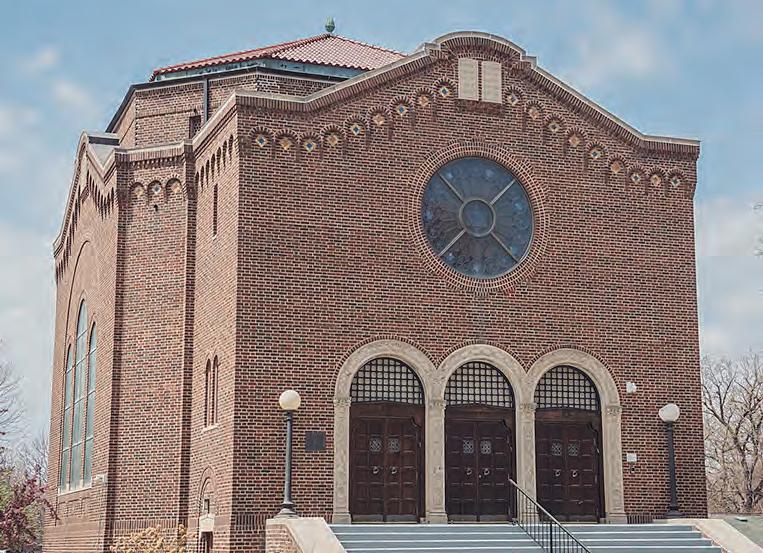
offer to move the quasi-endowed Friend Family Fund at the South Street Temple to a Jewish Federation of Omaha Foundation endowment with the opportunity to gain a 25% funding match. The Friend Family Fund was established by Jon Adland and Susan Friend Adland in memory of the generations of the Friend family who were Temple members going back to the nineteenth century, with the fund dedicated to supporting Temple youth who chose to attend Reform Jewish camps or participate in NFTY or other URJ youth activities. Investing these funds in a Jewish Federation of Omaha Foundation endowment ensures the continued impact of this gift for future generations of Temple youth. This will be the Temple’s first year as a Life & Legacy partner organization, and a number of members are already in the process of working with the Jewish Federation of Omaha Foundation to include

the Temple in their end of life giving.
Amy Bernstein Shivvers, Executive Director, Jewish Federation of Omaha Foundation shared, “The steps South Street Temple has taken are a testament to the board’s fiscal responsibility and dedication to securing a strong future. By establishing these endowments and participating in the Life & Legacy program, the Temple demonstrates how strategic planning and collaboration can empower congregations to thrive.” South Street Temple’s success is an invitation to other congregations and individuals to think creatively about legacy giving and endowment building. For more information about endowment opportunities or the Life & Legacy program, please contact Amy Bernstein Shivvers (ashivvers@jewishomaha. org or 402.334.6466). Together, we can build a brighter future for Nebraska’s Jewish community.










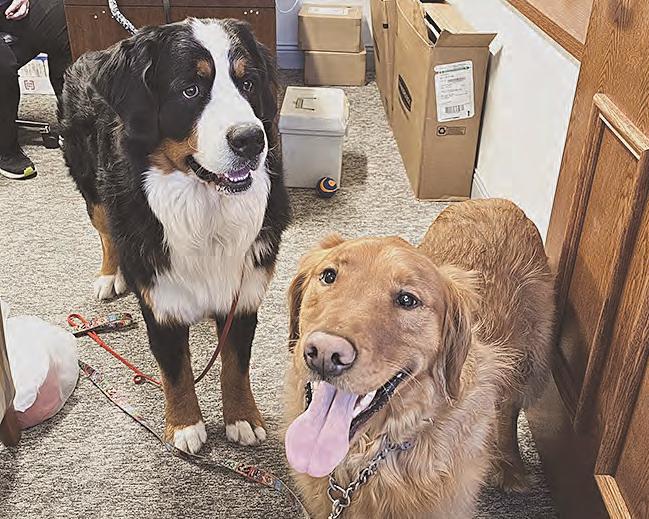


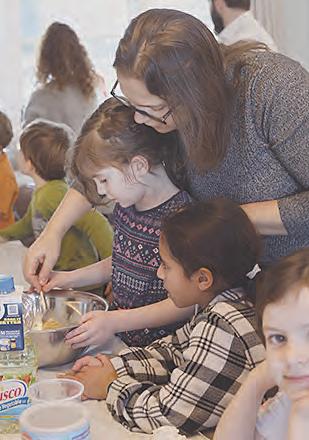
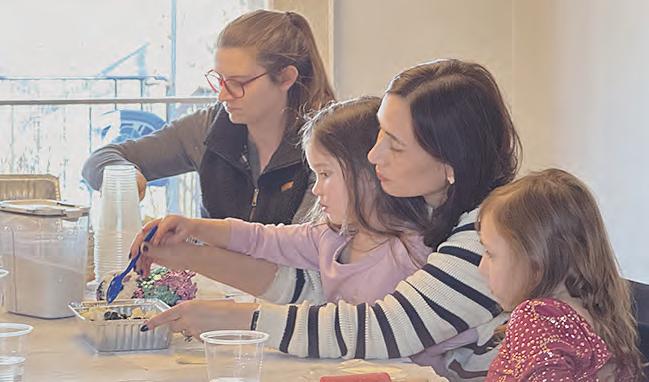
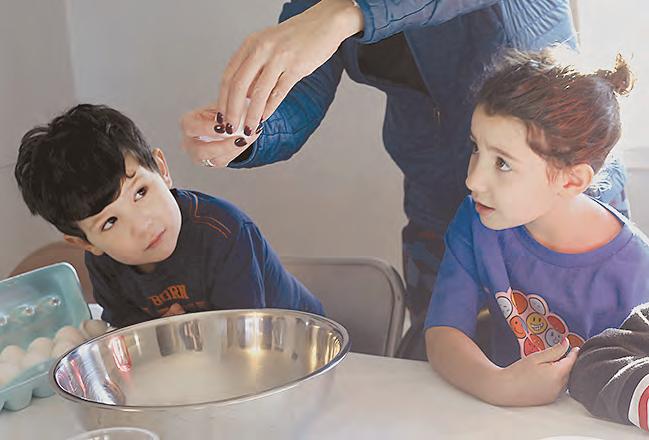
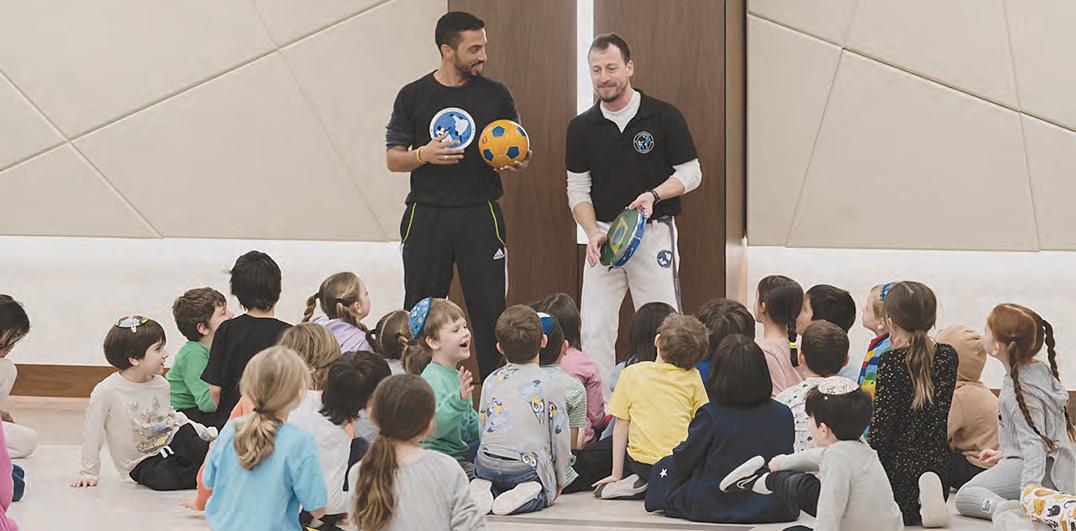
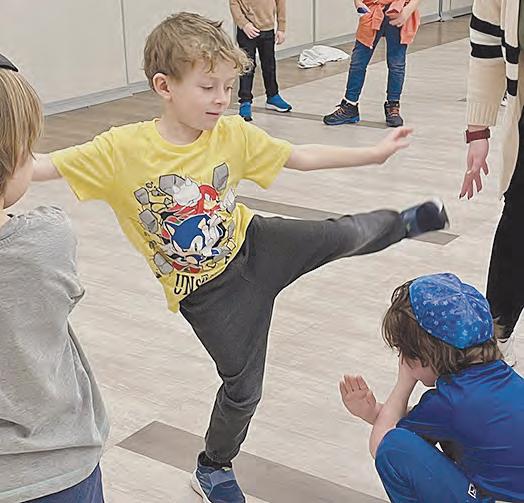
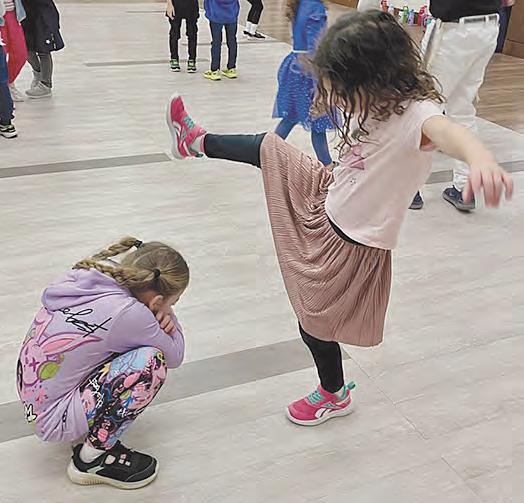
PHOTOS FROM RECENT JEWISH COMMUNITY EVENTS
SUBMIT A PHOTO: Have a photo of a recent Jewish Community event you would like to submit? Email the image and a suggested caption to: avandekamp@jewishomaha.org

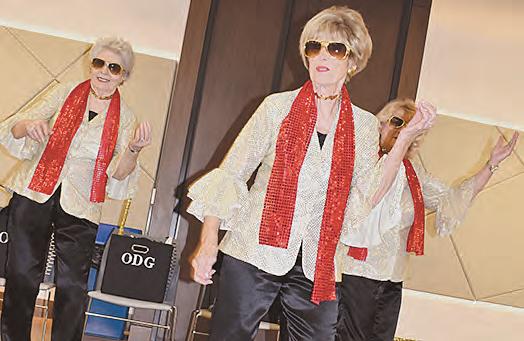
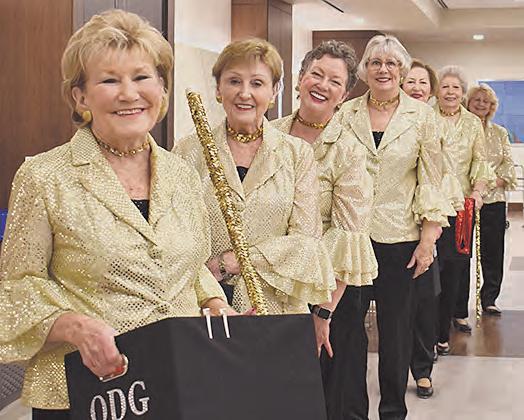
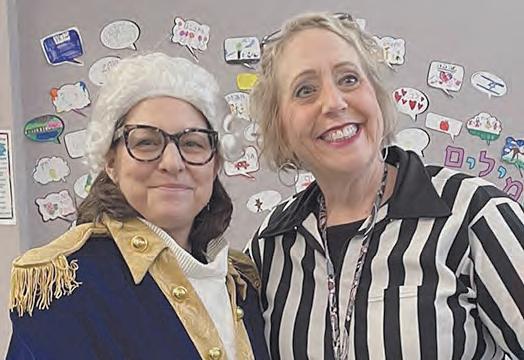

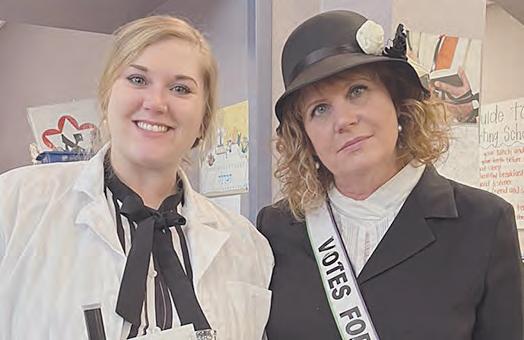
SINDIE KATSKEE AND CLAUDIA SHERMAN
Josh Sweet, who has taught outdoor, environmental, and adventure education for nearly 20 years in a variety of settings including local, regional, and national parks spanning a dozen states, will speak virtually at Beth El Synagogue for a Tu B’Shevat event, hosted by Ruach, on Repairing the Environment and Nature.
Josh is an alumnus of Beth El Talmud Torah, served on the boards for USY-BILU, BBYO-Omaha, and NFTY-OTYG while growing up in Omaha. He also played on the Omaha Maccabi Baseball Team in 2002. He is the son of Mark and the late Lori Sweet and stepson of Lynn Sweet.
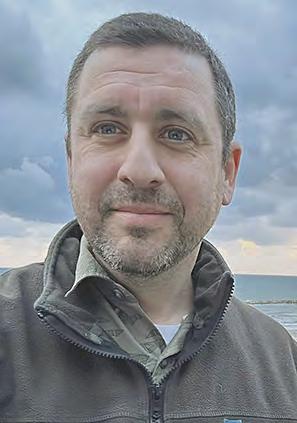
After graduating from Arizona State University as a Hillel Teaching Scholar with a degree in Parks and Recreation Management, Josh went on to teach weekly Hebrew School lessons in New York, California, Arizona, North Carolina, and Minnesota. During this time, he worked full time in places like Denali National Park, the Apostle Islands, the Blue Ridge Mountains, and the Adirondacks to name just a few.
Continued from page 4 works together here and that drills are much more realistic — decades ahead, without question,” said Eric Schreier, M.D., who specializes in physical medicine and rehabilitation in Fort Wayne, Ind. “Everyone works together. It’s [very] organized: the signs, the labels, the technology. They take it much more seriously.”
P2G participants received temporary credentialing from Israel’s Ministry of Health. Some saw patients. Anna Roshal, M.D., an oncologist in Indianapolis, saw 10 patients at the hospital, conversing with most of them in Russian, her mother tongue, having grown up in Belarus.
She had been in Israel just four months earlier to visit relatives. Profeta then told her about P2G and the medical mission in January. Roshal said she responded, “A medical trip? I can’t imagine any way a cancer doctor could be helpful. He said, ‘You do not understand. You’ll be helpful by being here, and then you’ll come back and join me in Indianapolis and talk to people.”
Josh’s passion for both the outdoors and Judaism eventually led him and his wife, Jillian Sweet, to teach a fifth-grade class on Eco-Judaism at the Shir Tikvah Synagogue in Minneapolis.
Today, Josh and Jillian live in Carver County, Minnesota, where Josh works for Three Rivers Park District at the Lowry Nature Center. Simultaneously, he serves as the Board President for Deep Portage Learning Center, a 54,000 square foot campus devoted to environmental learning on over 6,000 acres in the Minnesota north woods.
In February of 2024, Josh volunteered with the Israel Defense Forces as part of the Sar-El program. This past fall he volunteered for the Jewish Disaster Relief organization, Nechama, to help families in need affected by Hurricane Helene in North Carolina where he had worked as a Park Ranger.
Josh shared, “I’m happy to return virtually to the shul that I still consider my home synagogue. I look forward to sharing my experiences as an environmental educator and as a Jewish American on Thursday, Feb. 13, as part of minyan moments at Beth El.”
Beth El’s Ruach “Spirit” Group was created for our 55+ members to promote learning, health & wellness, socializing, teaching, and enjoying each other along the way!
Everyone is welcome; this event is not limited to people 55+! Mark your calendars and please join us to hear Josh speak at Beth El following 5:30 p.m. minyan on Thursday, Feb. 13. He is looking forward to joining us virtually and sharing his experiences and for us to learn ways to help our environment and nature.
tee and a longtime P2G volunteer.
The program and medical context appealed so much to Denver pediatrician Michael Milobsky, M.D., that he joined the mission, at his own expense, even though he doesn’t come from a P2G Central Area community.
“I wanted to show up in some way, with skin in the game,
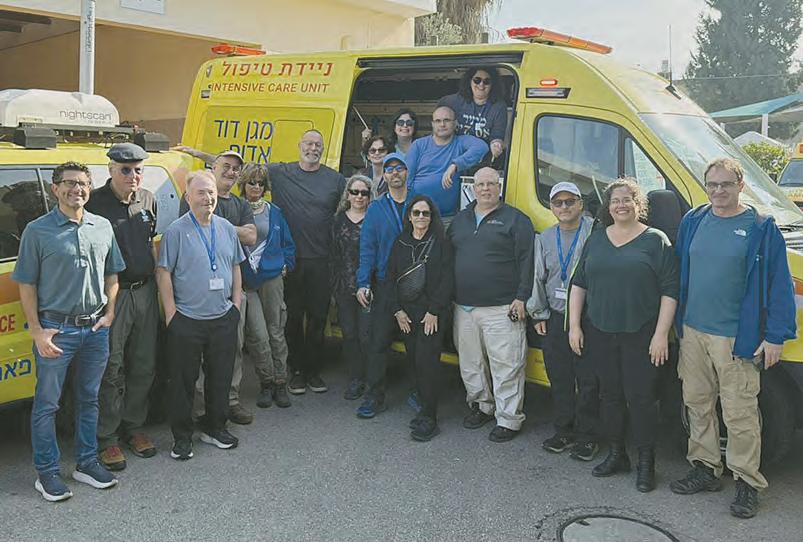
And so she signed on — the first of her 10 trips to Israel that wasn’t family-centric. “The first time I came to Israel [in 1992], it changed my life. All of a sudden, I realized who I am,” she explained.
Like Profeta, Michelle Elisburg, M.D., who practices pediatrics in Louisville, Ky., used the word “helpful,” but the equation went the other way for her.
Visiting the Jewish state and speaking with local pediatricians was a relief from the anti-Israel rhetoric she often encounters back home.
“When you’re being bashed and demonized all the time, talking to like-minded people is helpful. It’s self-care, because you don’t feel so alone,” said Elisburg. “It’s war, and I want to do something. If we were here at peacetime, we’d be talking about something else.”
The delegation’s program included observing procedures, making clinical rounds, seeing the hospital’s wartime underground command center, attending a lecture on treating oral and maxillofacial injuries suffered during the war and off-site visits to the Magen David Adom ambulance service’s local branch and to a military base’s medical clinic.
Participants also socialized at a home-hospitality program hosted by Toni Ziv, a member of P2G’s management commit-
and... do something more meaningful,” Milobsky said. Milobsky gained insight into Israeli healthcare professionals’ commitment when he attended a presentation on the medical center’s preparation for potential attacks from Hezbollah.
“Here’s a hospital that in an incredibly short period of time had to create a complex system to redistribute patients, move them to an underground bunker if necessary and have everyone available to fill their role,” he said. “Everyone’s willing to be part of the bigger picture. There’s a bigger job to do, and they’re willing to do it together.”
Writer-editor Hillel Kuttler can be reached at hk@Hillel TheScribeCommunications.com
Continued from page 5 supportive communities (many of them have discovered that people they once considered friends have turned against them), combatting loneliness. This summit offers a platform for them to share experiences, develop strategies, and build a stronger, interconnected network.





(Founded in 1920)
David Finkelstein
President
Annette van de Kamp-Wright
Editor
Richard Busse
Creative Director
Claire Endelman
Sales Director
Lori Kooper-Schwarz
Assistant Editor
Sam Kricsfeld
Digital support
Mary Bachteler
Accounting
Jewish Press Board
David Finkelstein, President; Margie Gutnik, Ex-Officio; Helen Epstein, Andrea Erlich, Ally Freeman, Dana Gonzales, Mary Sue Grossman, Hailey Krueger, Chuck Lucoff, Larry Ring, Melissa Schrago, Suzy Sheldon and Stewart Winograd.
The mission of the Jewish Federation of Omaha is to build and sustain a strong and vibrant Omaha Jewish Community and to support Jews in Israel and around the world. Agencies of the JFO are: Institute for Holocaust Education, Jewish Community Relations Council, Jewish Community Center, Jewish Social Services, Nebraska Jewish Historical Society and the Jewish Press Guidelines and highlights of the Jewish Press, including front page stories and announcements, can be found online at: www.jewishomaha.org; click on ‘Jewish Press.’ Editorials express the view of the writer and are not necessarily representative of the views of the Jewish Press Board of Directors, the Jewish Federation of Omaha Board of Directors, or the Omaha Jewish community as a whole. The Jewish Press reserves the right to edit signed letters and articles for space and content. The Jewish Press is not responsible for the Kashrut of any product or establishment.
Editorial
The Jewish Press is an agency of the Jewish Federation of Omaha. Deadline for copy, ads and photos is: Thursday, 9 a.m., eight days prior to publication. E-mail editorial material and photos to: avandekamp@jewishomaha.org ; send ads (in TIF or PDF format) to: rbusse@jewishomaha.org
Letters to the Editor Guidelines
The Jewish Press welcomes Letters to the Editor. They may be sent via regular mail to: The Jewish Press, 333 So. 132 St., Omaha, NE 68154; via fax: 1.402.334.5422 or via e-mail to the Editor at: avandekamp@jewishomaha.org.
Letters should be no longer than 250 words and must be single-spaced typed, not hand-written. Published letters should be confined to opinions and comments on articles or events. News items should not be submitted and printed as a “Letter to the Editor.”
The Editor may edit letters for content and space restrictions. Letters may be published without giving an opposing view. Information shall be verified before printing. All letters must be signed by the writer. The Jewish Press will not publish letters that appear to be part of an organized campaign, nor letters copied from the Internet. No letters should be published from candidates running for office, but others may write on their behalf.
Letters of thanks should be confined to commending an institution for a program, project or event, rather than personally thanking paid staff, unless the writer chooses to turn the “Letter to the Editor” into a paid personal ad or a news article about the event, project or program which the professional staff supervised. For information, contact Annette van de Kamp-Wright, Jewish Press Editor, 402.334.6450.
Postal The Jewish Press (USPS 275620) is published weekly (except for the first week of January and July) on Friday for $40 per calendar year U.S.; $80 foreign, by the Jewish Federation of Omaha. Phone: 402.334.6448; FAX: 402.334.5422.
Periodical postage paid at Omaha, NE. POSTMASTER: Send address changes to: The Jewish Press, 333 So. 132 St., Omaha, NE 68154-2198 or email to: jpress@jewishomaha.org
ANNETTE VAN DE KAMP-WRIGHT
Jewish Press Editor
Like many cities, Dublin recently held a public Holocaust memorial ceremony. In spite of being asked by Jewish organizations not to speak, Irish President Michael Higgins took the podium anyway. Higgins has been an outspoken critic of Israel since Oct. 7. At the commemoration, he again brought up the civilian death toll in Gaza. Some Jewish attendees protested his remarks, and were subsequently dragged out of the venue.
These aren’t great optics, and nobody should be surprised. No need to single out Ireland; from Anne Frank to Auschwitz, the anti-Israel movement has been co-opting the Shoah for their own purposes. What better way to fight us than to call us Nazis? The best part: historical knowledge or the ability to point out Bergen Belsen on a map is not even required. It’s victim-blaming at its finest, it’s easy, what’s not to like? Using a Holocaust remembrance to attack Israel as well as your own Jewish citizens, it’s a win-win for those who hate us.
No representative of the Israeli government was invited to speak at the commemoration at the actual Auschwitz on Jan. 27. If it weren’t for the American Jewish Committee hosting an event nearby, Israeli Education Minister Yoav Kisch would have traveled to Poland for nothing.
“As the world marks 80 years since the liberation of Auschwitz,” Larry Luxner wrote for the Jewish Telegraphic Agency, “one of Germany’s most prominent Holocaust scholars says twisting the facts about the Nazi extermination of 6 million Jews is
Editorials express the view of the writer and are not necessarily representative of the views of the Jewish Press Board of Directors, the Jewish Federation of Omaha Board of Directors, or the Omaha Jewish community as a whole.
far more harmful than outright denial — and that such distortion is a stepping stone from antisemitism into the mainstream.”
Not inviting an Israeli or Jewish presence, using commemoration to criticize Israel, is exactly that: distortion. It’s appropriating grief for one’s own purposes. We want the world to never forget, but there are conditions. Right now, those conditions aren’t met, and we find ourselves in a messy place.
Here’s the thing: people can deny, distort, abuse and even glorify the memory of the Shoah, but after all is said and done, there is a bigger truth. We know it. And we remember, even if they don’t. So rather than wasting time being upset by what others say and do, we can take comfort in the fact that we at least know our own story—even if that story itself is less than comfortable.
We have an advantage over those who would see us dead: they don’t know our story like we do. They don’t know who Haman was. They don’t know about Nebuchadnezzar, or Antiochus, or how Abimelech narrowly avoided being finished off by

Think about it: we know our story so well, because we find it in ritual, in the weekly parsha, in our holidays. It’s baked into our DNA, we use our story when we make hamantaschen, we use our story when we spin dreidels, we use our story when we host our seders and we express it in song, in art.
a woman (!) and what life was like for Pharaoh while he turned his back on G-d. If they did, they’d understand that we have survived in the face of incredible odds. The Jewish story may be one of hardship, of diaspora, of destroyed temples and pogroms, but it is also a story of life and light. It is a story of victory and love and strength. Because for every Antiochus, there is a Judah Maccabee, for each Haman there is an Esther, and for every Pharaoh, a Moshe.
RABBI MICAH STREIFFER
JTA
A religious leader rises before a head of state. Calmly, deliberately, they teach from their tradition, quote words of scripture, plead with the powerful man to govern with mercy. In so doing they implicitly call the powerful to task, criticizing them for past actions and current policies and challenging them to change. They are rewarded with anger and a demand for apology.
This is a familiar scene. Such moments of priestagainst-power dot the history of our society: Martin Luther King, Jr.; Abraham Joshua Heschel; Dietrich Bonhoeffer; even the biblical Moses — all stood before political leaders to demand justice and compassion.
The scene played out again this week in the Inauguration Day sermon by Episcopal Bishop Mariann Edgar Budde and the angry response by President Trump. Speaking in the National Cathedral on Monday, Budde delivered a message in which she called for unity and warned the president against sowing seeds of division and fear. “Honoring the inherent dignity of every human being,” she said, “means refusing to mock, discount, or demonize those with whom we differ.”
Budde’s sermon ended with an explicit plea to the president to “have mercy on the people in our country who are scared,” members of the LGBTQ+ and immigrant communities who “fear for their lives” or “whose children fear their parents will be taken away.”
It seems to have been this last bit that raised the president’s ire. His response was to condemn and insult, taking to Truth Social to call Budde a “socalled Bishop” and a “Radical Left hard line Trump hater” who “brought her church into the World of politics in a very ungracious way” and demanding an apology.
Trumpian bluster aside, the kerfuffle raises anew an old question about what part religious leaders ought to play in the public sphere. Should priests and rabbis have something to say about policy? Is it the role of ministers and imams to speak on matters of politics and partisanship? Did Budde overstep her bounds, and does she owe an apology? This is a question that has come up from time to
time in my own rabbinate, and one that most of the clergy I know have had to contend with in one way or another. After all, our society is (at least theoretically) founded on a separation of religion and state, so shouldn’t religion stay out of state matters? Shouldn’t ministers and rabbis keep their mouths shut when it comes to social policy?
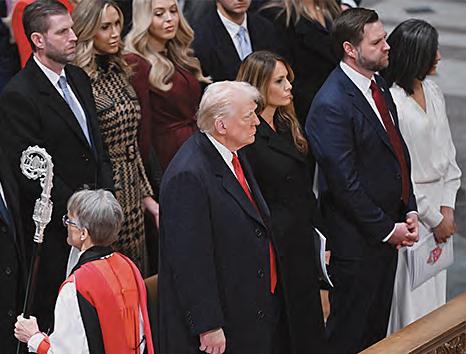
Here’s the thing: As a rabbi, I can tell you that speaking from a pulpit is an inherently political act, because it deals with social ethics. Unless you’re talking strictly about private ritual matters, giving a sermon necessarily involves encouraging people to confront their own behaviours and choices: how we treat others, how we use resources, how we care for our planet, the people on it, and the vulnerable in society. When people say their pastors and rabbis are getting “too political” it’s usually because they don’t like or agree with the message. That seems to be Trump’s problem with Bishop Budde’s remarks: She called him out on his behavior, and he doesn’t want to hear it.
Judaism has no expectation that religious leaders will stay away from talking about what is good for society. To the contrary, the Hebrew Bible institutionalizes this responsibility in the form of the prophet, who is a kind of social critic who reminds people of the gap between moral expectations and
actual behaviors. Although we colloquially use the word prophet to refer to someone who can predict the future, the biblical prophet doesn’t predict anything.
Rather, he or she (they were mostly he in the Bible) presents a vision of a better society by commenting on the present state of society:
By speaking truth to power: “Hear me, you who devour the needy and annihilate the poor of the land!” (Amos 8:4).
By calling out rulers: “You have been haughty and said, ‘I am a god.’ But you are not a god; merely a human” (Ezekiel 28:2).
By demanding social justice: “Unlock fetters of wickedness; let the oppressed go free; share your bread with the hungry, and to take the poor refugee into your home” (Isaiah 58:6-7).
By teaching humility: “Do justice, love mercy, and walk humbly with your God” (Micah 6:8).
Most of all, the biblical prophet calls upon leaders and citizens alike to do exactly what Bishop Budde pleaded: to have mercy and compassion on the vulnerable.
I’m not suggesting here that Bishop Budde is actually a prophet. Nor am I suggesting that this is simple or that there are no lines to be crossed. Clergy ought not endorse specific candidates or tell people how to vote, and they need to be mindful of their power and use it wisely — to challenge and to ruffle, to support the vulnerable and advocate for basic humanity, not to coerce or control or to foment hatred and division.
In the end, religion is at its best when it serves to “comfort the afflicted and afflict the comfortable.” When it offers us a thoughtful, truthful critique of our actions, while reminding us that we still have both the ability and the responsibility to make the world a better place.
Rabbi Micah Streiffer is the founder and director of LAASOK, a center for progressive Jewish text study. He hosts the Seven Minute Torah podcast and speaks at synagogues across North America.
The views and opinions expressed in this article are those of the author and do not necessarily reflect the views of JTA or its parent company, 70 Faces Media.
In a fraught moment in the film A Real Pain, Kieran Culkin, playing the more volatile of a pair of Jewish cousins who go on a roots tour of Poland, berates his fellow travellers for riding in a first-class train car in a country where so many Jews rode cattle cars to their deaths.
A few scenes later, after breaking away from the tour group, he happily sits in first class, essentially telling his cousin, played by Jesse Eisenberg, “Screw it. We’re owed this.”
“I love that scene,” said Ari Richter, the author and illustrator of Never Again Will I Visit Auschwitz, a “graphic family memoir” describing Richter’s own visits to the places where his Holocaust survivor grandparents lived and suffered. Richter said that in the train scenes, A Real Pain expertly captures the contradictions felt by second and third generation Jewish visitors like him on pilgrimages to a grim Jewish past.
In his book, Richter describes those emotions on a visit to the Dachau camp memorial. He is both impressed by the efforts made by the German curators to focus on “the nexus of German cruelty and Jewish suffering” (unlike the Polish guides at Auschwitz, where he learns “mostly about the suffering of non-Jewish Poles”) and touched by small gestures, like the “kosher-friendly options” on the menu at the Dachau café.
And yet...
“In a way, I know they seek my absolution,” Richter ruminates back at the hotel, “and I resent that I offer it by accepting their kindness.”
Richter’s is a multilayered book about his grandparents’ and great-grandparents’ imprisonment in Dachau, Buchenwald and Auschwitz, the lives they made in America; and what Richter calls the safe, “white American identity” he inherited. Richter draws on the survivor memoirs written and recorded by his relatives, collaging actual photographs with his own scratchy but realistic drawings.
But two important episodes in the book feature his rootsslash-research trips – in 2019 and 2021 — that included stops at Auschwitz, Dachau, Jewish cemeteries and his grandparents’ hometowns in present-day Poland and Germany.
The book describes a process familiar to Jewish visitors to the death camps and the former homes of vanished loved ones: an occasion to face the enormity of the Holocaust, the inheritance of family trauma and what being Jewish means to the pilgrim. In Never Again..., between scenes depicting his grandparents’ stories, Richter asks in the present if his relatives’ survival and second chances give him license to put the
past aside, and what lessons about Jewish life and survival he’d like to pass on to his children.
Richter’s book arrives at a perhaps not coincidental moment that recently saw the release of two films about such roots trips — A Real Pain and Lena Dunham’s 2024 film Treasure. They join a genre that already includes Jonathan Safran Foer’s 2002 novel Everything Is Illuminated, Francine Prose’s 1997 novella Guided Tours of Hell and screenwriter Jerry Stahl’s 2022 memoir, Nein, Nein, Nein!
So-called “dark tourism” has even spawned its own academic sub-specialty: In her 2014 book Jewish Poland Revisited:
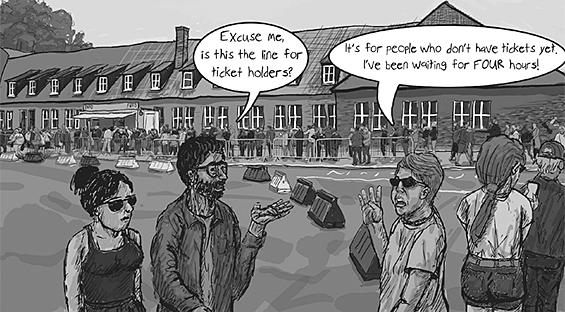
Heritage Tourism in Unquiet Places, anthropologist Erica T. Lehrer describes encounters between Jewish tourists and Polish locals and their halting and occasionally hostile attempts to understand each other.
Comedy is not the first thing that comes to mind when you consider visits to death camps, but if there is one thing the popular treatments of the visits share, it is a mordant sense of humor. Foer’s novel, and its 2005 film adaptation, is about the Jewish author’s journey to Ukraine in search of the woman who saved his grandfather’s life during the Nazi liquidation of the family shtetl. Perhaps the best-known character in the book is a local handler who speaks a comically broken English. Prose’s novella is about an obscure playwright enduring a tour of a concentration camp led by a flamboyant and much more successful writer who himself survived the camp. The tone, like the title, is satiric and pitch black.
And in Treasure, playing a journalist who accompanies her survivor father on a trip through 1990s Poland, Dunham goes for bittersweet comedy before the inevitable visit to Auschwitz and her father’s stolen home.
The humor could be a distinctly Jewish response to tragedy, or a choice to make morbid material more palatable to a wide audience. The very idea of death camps being turned into tourist sites, with gift shops and snack bars, is the sort of “ludicrous” incongruity that everyone from Freud to Schopenhauer to Mel Brooks include in their theories of laughter. Eisenberg told interviewers that A Real Pain was inspired by an advertisement promising a “Holocaust tour, with lunch.”
Stahl’s gonzo travelogue gleefully mocks the tourist trappings at Auschwitz, Buchenwald and Dachau, but he ultimately concludes that they don’t diminish the impact of his visits. “I don’t care if you can buy a slice after the crematorium and wash it down with Fanta,” he writes. “Nothing, in the end, can diminish the searing gravitas of the physical place on which the martyrs, our ancestors, walked.”
On Jan. 27, International Holocaust Remembrance Day, the world marked 80 years since the liberation of Auschwitz, meaning living Holocaust survivors could only have been youngsters when the war ended. Their children, grandchildren and greatgrandchildren could only have learned about the Holocaust second-hand in an inheritance that some call “generational trauma” and Richter calls a “generational trust.”
These third-generation works also share an intense self-consciousness: Eisenberg and Dunham focus less on the history of the Holocaust or the experiences of the victims and survivors than on the interiors of the young protagonists. Richter’s book digs deep into his relatives’ histories and memories — throwing his own struggle to make sense of the “generational trust” into sharp relief. In the book his sense of complacency as a middle-class Jewish American is shattered by the massacre at the Tree of Life synagogue in 2018 and the resurgence of the far right. He finds solace in the words of his grandfather Karl: “I am ultimately an optimist — I have to be. Because the haters have won if they succeed in hardening your heart.”
Late in his book, after the birth of a daughter, Richter begins to consider the next generation. “I want her to feel completely free in the world,” he writes, “unencumbered by the pressures of Jewish continuity and undoing Hitler’s work.” At the same time, he finds it sad to think about a cultural heritage “erased through assimilation into generic American whiteness.”
Andrew Silow-Carroll is editor at large of the New York Jewish Week and managing editor for Ideas for the Jewish Telegraphic Agency.
This article was edited for length. Please see more at www.omahajewishpress.com
This weekend, Rabbanit Leah Sarna will be installed as the first senior rabbinic leader of her Orthodox synagogue. The communal event is a cause for celebration by Rabbanit Sarna’s local Philadelphia-area community, Kehillat Sha’arei Orah. But for Orthodox women everywhere, this installation is extraordinary. In 2009, the trajectory for Orthodox women to become senior rabbinic leaders in synagogues seemed straightforward and inevitable. Step one: Open up a yeshiva, Yeshivat Maharat, to ordain Orthodox women. Step two: Give them rigorous training to be impactful leaders for the Jewish community. Step three: Ordain them and place them in positions in Orthodox synagogues, schools and communal organizations, and in hospitals as chaplains. Done.
I naively assumed that the next step along this trajectory would be growth in their jobs. We had, after all, already cracked a particularly tough glass ceiling. Women were in! They served in assistant rabbinic positions in Orthodox synagogues around the country. I figured they would then follow a straight line, seamlessly getting promoted to senior-level positions in their organizations. But the gender gap prevailed, and talented leaders in the Jewish community found their growth was stunted. A decade into Maharat’s existence, our graduates bumped up against the highest and hardest glass ceiling as they sought senior roles. They were told that there was no additional money to be allocated for increased responsibilities, or that their role was always intended to be junior. Some graduates were burned out — the rigorous and constant demands of rabbinic life impeded their ability to achieve more integrated balance in their lives. They all wanted to keep teaching Torah and serving the Jewish people. But none of them were given the authority or respect to keep leading. The old trope, “the community is not yet ready,” was once again bandied about.
The truth is, I shouldn’t have been naive. Our forebears from other denominations experienced similar challenges.
The journey of Orthodox female rabbis bears striking similarities to the trajectory of the first female rabbis in the Reform movement. While liberal denominations have since made significant strides in women’s representation in rabbinic roles, challenges persist across all streams of Judaism. Looking to other movements, we can better understand the obstacles faced
by Orthodox women and the progress that remains to be made.
When Sally Priesand became the first woman ordained as a rabbi in America in 1972, she entered a world unprepared to fully accept her. Of her 36 fellow Reform graduates, Rabbi Priesand was the last to find a job. She became the assistant rabbi at the Stephen Wise Free Synagogue, a large synagogue in Manhattan, and stayed for seven years. When the senior rabbi role opened, Priesand was not offered the role.

In a 2022 interview, she explained that “neither the Stephen Wise Free Synagogue, nor any other synagogue, would accept a woman as the senior rabbi at that time. And I’m telling you the story, because for two years, I was not able to find a job, and I served as a chaplain at Lenox Hill Hospital, and I accepted a part-time position at a synagogue in Elizabeth, New Jersey — a synagogue of older members who were always very warm and welcoming.”
She continued, “At that time, that was the only time that I almost decided to leave the rabbinate. I was very frustrated, and I was very unhappy. I didn’t feel that our movement did anything at all to prepare people for women as their spiritual leaders.”
Decades later, women rabbis in the Reform movement continue to face barriers to senior leadership. In 2018, women made up approximately 34% of the Reform rabbinate, yet men outnumbered women four to one among senior or solo rabbis in Reform congregations. Women are also more likely to serve as associate or assistant rabbis, roles that often carry less prestige, decision-making authority and compensation. Furthermore, as of 2017, women in senior or solo roles at larger
Reform congregations earned approximately 85% of what their male counterparts made, according to the Forward, highlighting ongoing gender-based wage gaps.
The Conservative movement, which began ordaining women with Rabbi Amy Eilberg in 1985, has experienced similar patterns. By 2010, women comprised about 17% of the movement’s Rabbinical Assembly membership, and as of 2020, women represented 24% of Conservative rabbis actively serving in North America. Despite these gains, the Forward reported that women in the Conservative movement remain underrepresented in senior leadership positions, with limited access to the most prominent and influential pulpits.
In both the Reform and Conservative movements, women are overrepresented in assistant roles and underrepresented in senior ones. This dynamic often reflects broader societal biases, including the perception that women are better suited to support roles rather than positions of ultimate authority.
Despite these obstacles, progress has been made in liberal movements. Likewise, the progress made by women in the Orthodox community is significant. Twelve Orthodox women who have graduated from Yeshivat Maharat now serve in senior roles, which marks an important milestone and provides hope for the future.
Six of Maharat’s alumnae have founded their own communities, in Philadelphia, Brooklyn, Haifa, Tel Aviv, London and Paris. Others were hired to lead or co-lead congregations across the United States. In addition, two more Orthodox women, an American in Riverdale, New York, and an Israeli in Efrat, are senior leaders of their own Orthodox shuls.
These leaders are breaking new ground, creating models for the next generation, and demonstrating that Orthodox women such as Rabbanit Sarna, also a Maharat alumna, excel as rabbinic leaders. By continuing to address systemic barriers and support the advancement of women rabbis, the Orthodox community can build on this progress and foster greater gender equality in religious leadership.
Rabba Sara Hurwitz is the co-founder and president of Yeshivat Maharat, and serves on the rabbinic staff at The Bayit – The Hebrew Institute of Riverdale.
The views and opinions expressed in this article are those of the author and do not necessarily reflect the views of JTA or its parent company, 70 Faces Media.
B’NAI ISRAEL SYNAGOGUE
618 Mynster Street Council Bluffs, IA 51503-0766
712.322.4705 www.cblhs.org
BETH EL SYNAGOGUE
Member of United Synagogues of Conservative Judaism 14506 California Street Omaha, NE 68154-1980
402.492.8550 bethel-omaha.org
BETH ISRAEL
SYNAGOGUE
Member of Union of Orthodox Jewish Congregations of America 12604 Pacific Street Omaha, NE. 68154
402.556.6288 BethIsrael@OrthodoxOmaha.org
CHABAD HOUSE
An Affiliate of Chabad-Lubavitch 1866 South 120 Street Omaha, NE 68144-1646
402.330.1800 OChabad.com email: chabad@aol.com
LINCOLN JEWISH COMMUNITY:
B’NAI JESHURUN
South Street Temple
Union for Reform Judaism 2061 South 20th Street Lincoln, NE 68502-2797
402.435.8004 www.southstreettemple.org
OFFUTT AIR
FORCE BASE
Capehart Chapel 2500 Capehart Road Offutt AFB, NE 68123
402.294.6244 email: oafbjsll@icloud.com
TEMPLE ISRAEL
Union for Reform Judaism (URJ) 13111 Sterling Ridge Drive Omaha, NE 68144-1206
402.556.6536 templeisraelomaha.com
LINCOLN JEWISH COMMUNITY:
TIFERETH ISRAEL
Member of United Synagogue of Conservative Judaism 3219 Sheridan Boulevard Lincoln, NE 68502-5236 402.423.8569 tiferethisraellincoln.org
Monthly Speaker Series Service, Friday, Feb. 14, 7:30 p.m. with our guest speaker, Thomas Fohner. Our service leader is Larry Blass. Everyone is always welcome at B’nai Israel!
For information about our historic synagogue, please visit our website at www.cblhs.org or contact any of our other board members: Renee Corcoran, Scott Friedman, Rick Katelman, Janie Kulakofsky, Howard Kutler, Carole and Wayne Lainof, Ann Moshman, MaryBeth Muskin, Debbie Salomon and Sissy Silber. Handicap Accessible.
Services conducted by Rabbi Steven Abraham and Hazzan Michael Krausman.
IN-PERSON AND ZOOM MINYAN SCHEDULE: Mornings on Sundays, 9:30 a.m.; Mondays and Thursdays, 7 a.m.; Evenings on Sunday-Thursday, 5:30 p.m.
FRIDAY: Kabbalat Shabbat, 6 p.m. at Beth El & Live Stream.
SATURDAY: Shabbat Shira Morning Services, 10 a.m. at Beth El and Live Stream; Jr. Congregation (Grades K-12), 10 a.m.; Havdalah, 6:25 p.m. Beth El and Zoom.
SUNDAY: World Wide Wrap, 9:30 a.m.; BESTT (Grades K-7), 9:30 a.m.; Hands-On Judaism, 10:30 a.m. with Hazzan Krausman.
TUESDAY: Mishneh Torah, 10:30 a.m. with Rabbi Abraham
WEDNESDAY: BESTT (Grades 3-7), 4 p.m.; Hebrew High (Grades 8-12), 6 p.m.
THURSDAY: Tu B’Shvat Program with the Ruach Group, 6 p.m.
FRIDAY-Feb. 14: Kabbalat Shabbat, 6 p.m. at Beth El & Live Stream.
SATURDAY-Feb. 15: Shabbat Morning Services and Bar Mitzvah of Charlie Menin, 10 a.m. at Beth El and Live Stream; Jr. Congregation (Grades K-12) 10 a.m.; Havdalah, 6:35 p.m. Beth El and Zoom. Please visit bethel-omaha.org for additional information and service links.
FRIDAY: Nach Yomi, 6:45 a.m.; Shacharit, 7 a.m.; Mincha/Kabbalat Shabbat/Candlelighting, 5:30 p.m.
SATURDAY: Shabbat Kollel, 8:30 a.m.; Shacharit, 9 a.m.; Tot Shabbat, 10:30 a.m.; Youth Class, 10:45 a.m.; Soulful Torah, 4:35 p.m. with Rabbi Geiger; Mincha, 5:20 p.m.; Kids Activity/Laws of Shabbos, 5:50 p.m.; Havdalah, 6:33 p.m.
SUNDAY: Shacharit 9 a.m.; Mincha/Ma’ariv 5:40 p.m.
MONDAY: Nach Yomi 6:45 a.m.; Shacharit 7 a.m.; Monday Mind Builders, 4 p.m.; Mincha/Ma’ariv, 5:40 p.m.
TUESDAY: Nach Yomi, 6:45 a.m.; Shacharit, 7 a.m.; Mincha/Ma’ariv, 5:40 p.m.
WEDNESDAY: Nach Yomi, 6:45 a.m.; Shacharit, 7 a.m.; Mincha/Ma’ariv, 5:40 p.m.
THURSDAY: Nach Yomi, 6:45 a.m.; Shacharit, 7 a.m.; Character Development, 9:30 a.m.; Mincha/ Ma’ariv, 5:40 p.m.; Tu B’Shvat Seder, 6 p.m.
FRIDAY-Feb. 14: Nach Yomi, 6:45 a.m.; Shacharit, 7 a.m.; Mincha/Kabbalat Shabbat/Candlelighting, 5:39 p.m.
ANNETTE VAN DE KAMP-WRIGHT
Jewish Press, Editor
On Feb. 23, from 3 to 5 p.m., community volunteers will gather in the Shirley and Leonard Goldstein Community Engagement Venue at the Staenberg Kooper Fellman Campus for Super Sunday.
“Volunteers will reach out to the community to ask for pledges to the 2025 Annual Campaign,” JFO Director of Development Rachel Ring said. “We’ll be offering babysitting for our volunteers who have children three years old and up. They will have fun doing arts and crafts and playing games with the ‘big kids.’ Of course, we’ll have yummy kosher snacks for all of our volunteers!”
In addition to making calls, volunteers will also handwrite thank you notes to Campaign donors.
SATURDAY-Feb. 15: Shabbat Kollel, 8:30 a.m.; Shacharit, 9 a.m.; Tot Shabbat, 10:30 a.m.; Youth Class, 10:45 a.m.; Soulful Torah, 4:45 p.m.; Mincha, 5:30 p.m.; Kids Activity/Laws of Shabbos 6 p.m.; Havdalah, 6:41 p.m.
Please visit orthodoxomaha.org for additional information and Zoom service links.
All services are in-person. All classes are being offered in-person and via Zoom (ochabad.com/academy). For more information or to request help, please visit www.ochabad.com or call the office at 402.330.1800.
FRIDAY: Shacharit, 8 a.m.; Lechayim, 5 p.m. go to ochabad.com/Lechayim to join; Candlelighting, 5:30 p.m.
SATURDAY: Shacharit, 10 a.m. followed by Kiddush and Cholent; Shabbat Ends, 6:32 p.m.
SUNDAY: Sunday Morning Wraps, 9 a.m.
MONDAY: Shacharit 8 a.m.; Personal Parsha 9:30 a.m. with Shani Katzman; Intermediate Biblical Hebrew Grammar, 10:30 a.m. with Prof. David Cohen; Parsha Reading, 6 p.m. with Prof. David Cohen; Translating Words of Prayer, 7 p.m. with Prof. David Cohen.
TUESDAY: Shacharit, 8 a.m.; Translating Words of Prayer, 11 a.m. with David Cohen; Intermediate Biblical Hebrew Grammar, 6 p.m. with Prof. David Cohen; Introductory Biblical Hebrew Grammar, 7 p.m. with Prof. David Cohen.
WEDNESDAY: Shacharit, 8 a.m.; Mystical Thinking (Tanya) 9:30 a.m. with Rabbi Katzman; Introductory Biblical Hebrew Grammar, 10:30 a.m. with Prof. David Cohen; Parsha Reading, 11:30 a.m. with Prof. David Cohen.
THURSDAY: Shacharit, 8 a.m.; Introduction to Alphabet, Vowels & Reading Hebrew, 10 a.m.; Advanced Biblical Hebrew Grammar, 11 a.m. with Prof. David Cohen; Talmud Study, noon-1 p.m. with Rabbi Katzman; Introduction to Alphabet, Vowels & Reading Hebrew, 6 p.m.; Code of Jewish Law Class, 7 p.m.
FRIDAY-Feb. 14: Shacharit, 8 a.m.; Lechayim, 5 p.m. go to ochabad.com/Lechayim to join; Candlelighting, 5:39 p.m.
SATURDAY-Feb. 15: Shacharit 10 a.m. followed by Kiddush and Cholent; Shabbat Ends, 6:40 p.m.
LINCOLN JEWISH COMMUNITY: B’NAI JESHURUN & TIFERETH ISRAEL
Services facilitated by Rabbi Alex Felch. All services offered in-person with live-stream or teleconferencing options.
FRIDAY: Shabbat Candlelighting, 5:34 p.m.; Kabbalat Shabbat Service, 6:30-7:30 p.m. with guest speaker Aimee Hyten and led by Rabbi Alex at SST.
SATURDAY: Shabbat Service, 9:30-11 a.m. led by Rabbi Alex at TI; Torah Study, noon on Parshat Beshalach led by TBD via Zoom; Havdalah, 6:44 p.m.
SUNDAY: LJCS Classes, 9:30-11:30 a.m. at TI; Men’s Bike/Coffee Group, 10:30 a.m. at The Mill on the Innovation Campus. For more information or questions please email Al Weiss at albertw801@gmail.com; Adult Ed: Intro to Judaism Class, noon at TI. Please contact Rabbi Alex to register or to ask any questions.
WEDNESDAY: LJCS Hebrew School, 4:30-6 p.m. at TI; Jewish Themes Through Jewish Films Movie
“I’m excited to be part of Super Sunday this year,” Super Sunday Chair Erika Lucoff said. “The Federation supports important agencies and programs in our local community as well as abroad. I’m glad to be part of the efforts to raise money to support these causes.”
‘Super Sunday Sweep Events’ are held annually to make sure the JFO reaches the entire community, and give everyone the opportunity to contribute to the Annual Campaign.
“It’s also a chance for our community members to reach out to their peers in support of a common goal – a successful 2025 Annual Campaign,” Rachel added.
According to Jewish tradition, the highest form of tzedakah or charity is giving to a central campaign or community fund or kupah. Our Annual Campaign is a longstanding celebration of hope, resilience, and the power of giving. Your donation helps keep our community vibrant and allows us all to create memories and pass our traditions on to future generations. There are so many things your donation helps realize, from a vibrant dance program to a top-of-the-line preschool, from summer camp to the Omaha Jewish Film Festival.
An important part of our mission is to build
Night, 6:30-8:30 p.m. at SST.
FRIDAY-Feb. 14: Shabbat Candlelighting, 5:42 p.m.; Kabbalat Shabbat Service and Poppy Dishman Bat Mitzvah 6:30-7:30 p.m. led by Rabbi Alex at SST.
SATURDAY-Feb. 15: Shabbat Service and Poppy Dishman Bat Mitzvah 10 a.m. led by Rabbi Alex at SST; Torah Study, noon on Parshat Yitro led by TBD via Zoom; Lincoln YJI Valentine's Havdalah for Jewish Young Adults, 5:30-7:30 p.m at Tifereth Israel with Child Care: Available. Please RSVP to the YJI Facebook invitation, on GroupMe, or via email at lincoln yji@gmail.com so we have a headcount; Potluck Dinner and Family Game Night, 6 p.m. at SST. Please bring a dish to share. Adults and kids of all ages are welcome; Havdalah, 6:51 p.m.
FRIDAYS: Virtual Shabbat Service, 7:30 p.m. every first and third of the month at Capehart Chapel. Contact TSgt Jason Rife at OAFBJSLL@icloud.com for more information.
In-person and virtual services conducted by Rabbi Benjamin Sharff, Rabbi Deana Sussman Berezin, and Cantor Joanna Alexander.
FRIDAY: Drop-In Mah Jongg, 9 a.m. In-Person; Special Shabbat Celebrating Our Third Grade Class and the 50th Anniversary of Women in the Cantorate, 6 p.m. In-Person & Zoom.
SATURDAY: Torah Study, 9:15 a.m. In-Person; Shabbat Morning Service, 10:30 a.m. In-Person & Zoom..
SUNDAY: Second Sunday Breakfast Service, 9 a.m. at Stephen Center — In-Person; Grades PreK-7, 9:30 a.m. In-Person; Book Club, 10:30 a.m. In-Person; Prayer Preparation: Chanting and Reading Prayers, 1 p.m. In-Person; Superbowl Party, 5 p.m. In-Person.
TUESDAY: Gender Dynamics of the Israel-Hamas War, 7 p.m. In-Person
WEDNESDAY: Yarn It, 9 a.m. In-Person; Grades 36, 4:30 p.m. In-Person; Hebrew High: Grades 8-12, 6 p.m. In-Person; How the Israelites Became The Jews, 6:30 p.m. In-Person.
THURSDAY: The Zohar: Thursday Morning Class 11 a.m. with Rabbi Sharff and Rabbi Azriel — In-Person & Zoom
FRIDAY-Feb. 14: Drop-In Mah Jongg, 9 a.m. In-Person; Shabbat B’yachad Service, 6 p.m. In-Person & Zoom.
SATURDAY-Feb. 15: Torah Study, 9:15 a.m. In-Person; Shabbat Morning Service, 10:30 a.m. In-Person & Zoom. Please visit templeisraelomaha.com for additional information and Zoom service links.
As of January 1, 2025, the Jewish Press will charge $180 for the inclusion of standard obituaries, up to 400 words. Photos may be included if the family so wishes. For many years, we have held off on making this decision. However, it is no longer financially responsible for us to include obituaries at no charge. For questions, please email avandekamp@ jewishomaha.org. Obituaries in the Jewish Press are included in our print edition as well as our website at www.omahajewishpress.com
bridges of understanding with our neighbors, strengthening the bonds that make Jewish Omaha a welcoming and inclusive home for all. But we cannot do this alone. Your support is the driving force behind every life touched, every family uplifted, and every dream realized.
Donations to the JFO Annual Campaign fuel the heart of our community. Together, we can create lasting change for generations to come. The Annual Campaign embodies the values and traditions of the Jewish community more than anything else we do. It says that we care about people, not about their politics or religious practices. It says that we will as a community address critical, often lifethreatening issues.
Many of you reading this have already pledged, and we thank you. If you have not, please answer the call on Super Sunday. If anyone is interested in volunteering, they can contact Super Sunday chair Erika Lucoff at elucoff@rbjh.com or Rachel Ring at rring@jewishomaha.org
B’NAI MITZVAH
Poppy Dishman, daughter of Amy and Steven Dishman, will celebrate her Bat Mitzvah on Saturday, Feb. 15, 2025, at Lincoln Jewish Community: B'Nai Jeshurun.
Poppy is a seventh-grade honor roll student at Irving Middle School in Lincoln and was one of 14 students chosen from her school to sing in the All-City Middle School Choir.
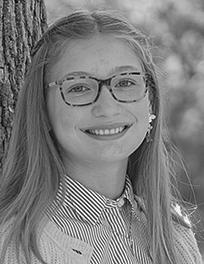
She dances competitively with Nebraska Ballet Theatre and School and has performed for three years with The Lincoln Midwest Ballet Company in The Nutcracker. She also enjoys singing, skiing, traveling, and archery.
For her mitzvah project, Poppy held multiple bake sales to raise funds to help the Lincoln Midwest Ballet Company purchase
new Snow Corps costumes. Grandparents are Paula and Daniel Dishman, and Nancy and Carroll Michaels both of North Platte, Nebraska, and Dr. Timothy J Reitz of blessed memory.
Charles Frederick Menin will celebrate his Bar Mitzvah on Saturday, Feb. 15, 2025, at Beth El.
Charlie is a seventh-grade student at Brownell Talbot and a member of the seventh grade basketball team.
Charlie is interested in basketball, loves to ride his bike, is creative and loves doing art projects. He enjoys playing the piano and is learning to crochet.
He has an older brother, Kooper.
JTA
The oldest living American-Israeli hostage has exited Gaza, one of three Israelis Hamas released on Saturday in accordance with the terms of a ceasefire deal.
Keith Siegel, 65, was released after a seaside ceremony in Gaza City where he briefly walked across a stage and waved, a performance that Hamas has required of the hostages it has recently freed. He was wearing a hat and walked on his own, though he appeared to be supported by two Hamas terrorists as he mounted the stage and descended from it.
Viewing her husband via video for the first time since November 2023, when she was released during a previous ceasefire, Aviva Siegel exclaimed, “Here he is! He looks good!” on a video distributed by the Israeli government. She was accompanied by the couple’s son Shai, whose survival when Hamas attacked Israel on Oct. 7, 2023, was unclear to her and her husband while she was a hostage.
Subsequent footage showed Keith Siegel, who moved to Israel as a young adult from his native North Carolina, flashing a thumbs-up sign after being turned over to Israeli troops and embracing his family in the hospital.
Siegel was released shortly after two other hostages, Yarden Bibas and Ofer Kalderon.
Bibas, 35, is the father of the only children who remain in Gaza. He appeared in a hostage video in November 2023 that showed him responding to being told that his wife, Shiri, and sons Ariel and Kfir, had been killed. Israel has never confirmed

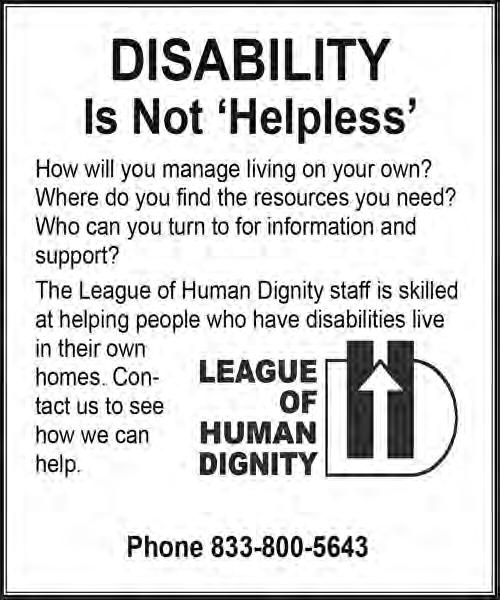
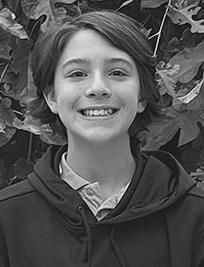



Hamas’ allegation that the mother and young children were dead, but has said there are “grave concerns” about them and did not insist on their release prior to that of living men.
In a video that Israel released Saturday, Bibas embraced his parents upon their reunion.
Kalderon, 54, was abducted with two of his children from Kibbutz Nir Oz. Sahar, 17, and Erez, 12, were released during the November 2023 ceasefire after 52 days in captivity. Israel released a video Saturday showing Kalderon, who greeted friends outside the hospital where he was taken, embracing all four of his children.
In a change, the handover process on Saturday went smoothly and contained little of the unruly crowds that had characterized other recent hostage releases. Israeli officials had threatened to delay releasing Palestinian security prisoners, which it agreed to free under the ceasefire, unless Hamas guaranteed safe and orderly handovers.
Groups of hostages have been released periodically since the current ceasefire began on Jan. 19. There remain 79 hostages, of whom 35 are thought to be living, including two Americans. One, Sagui Dekel-Chen, is on the list to be released during the current ceasefire, while the other, Edan Alexander, would be released only if the ceasefire is extended.
Israeli Prime Minister Benjamin Netanyahu announced on Saturday that he would open negotiations toward an extension on Monday, the date required under the current agreement, as part of his visit to Washington, D.C., where he plans to meet with President Donald Trump.
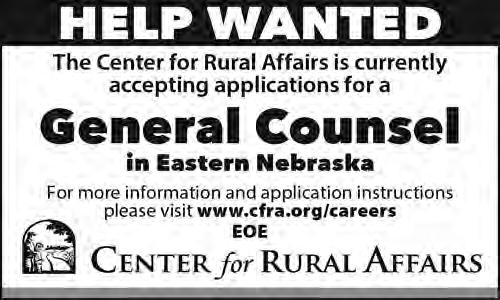
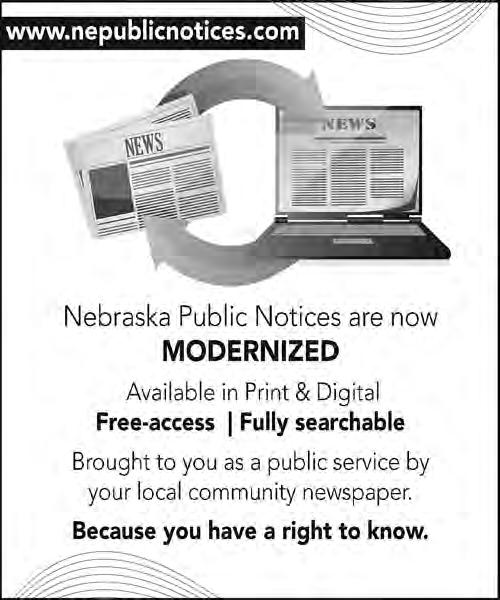

ATTENTION ADVERTISERS! For $225/25 word classified you can advertise in over 150 Nebraska newspapers. For more information contact the Jewish Press or call 1-800-369-2850.
HELLO NEBRASKA! Introducing www.nepublicnotices.com, a new public notice website presented as a public service by all Nebraska newspapers. Free access, fully searchable – because democracy depends upon open government and your right to know.
BANKRUPTCY RELIEF! Help stop Creditor Harassment, Collection Calls, Repossession and Legal Actions! Speak to a Professional Attorney and Get the Help You NEED! Call NOW 844-215-3629
AFFORDABLE PRESS Release service. Send your message to 155 newspapers across Nebraska for one low price! Call 1-800369-2850 or www.nebpress.com for more details.
FOR SALE – CELL PHONE
SWITCH AND save up to $250/year on your talk, text and data. No contract and no hidden fees. Unlimited talk and text with flexible data plans. Premium nationwide coverage. 100% U.S. based customer service. For more information, call 1-877-768-5892.
PORTABLE OXYGEN Concentrator? May be covered by Medicare! Reclaim independence and mobility with the compact design and long-lasting battery of Inogen One. Free information kit! Call 855-385-3580.
PREPARE FOR power outages today with a Generac Home Standby Generator. Act now to receive a FREE 5-Year warranty with qualifying purchase. Call 1-402-899-2584 today to schedule a free quote. It’s not just a generator. It’s a power move.
HOME SERVICES
DOES YOUR basement or crawl space need some attention? Call Thrasher Foundation Repair! A permanent solution for waterproofing, failing foundations, sinking concrete and nasty crawl spaces. FREE Inspection & Same Day Estimate. $250 off ANY project with code GET250. Call 1-844-958-3431.
WANTED TO BUY
BUY 8,000 cars a week. Sell your old, busted or junk car with no hoops, haggles or headaches. Sell your car to Peddle. Easy three step process. Instant offer. Free pickup. Fast payment. Call 1-855-910-0760.
It may be the midst of winter, but it’s already time to plan summer activities to keep kids active and engaged. Look no further than Beth Israel Synagogue’s summer experience, Camp JYI BI. Scheduled for June 16–July 3, 2025, the official camp hours will be 9 a.m.–1:30 p.m. with early drop-off at 8:30-9 a.m. and extended care available from 1:30-4 p.m. The fun is open to kindergarten through 8th grade, based on ages for the 2025-2026 school year.
Last year’s camp was an overwhelming success, giving kids in kindergarten through 8th grade the chance to have a wide variety of experiences. Beth Israel’s Rabbi Mordechai Geiger was camp director and his sister, Ilana Ester Geiger, was the head camp counselor. Ilana, a 1st grade teacher, is a highly sought after camp counselor in the Los Angeles area for over eight years. She, along with two good friends from LA, provided a daily spark and an ongoing sense of fun for the campers.
tivities including sports, nature experiences, cooking, water fun, crafts, dancing, games, Israel time, learning, and more. There will be weekly field trips and special events. Included again will be a line-up of activities by special guests, many of whom will be Beth Israel members, providing an array of ex-

The 2024 camp featured a great variety of experiences including:
• Mika Mizrachi, Omaha’s shlicha, led a wide array of Israel activities.
• Campers proudly displayed their tie blanket creations, taught by Lynne Saltzman.
• Conny Alperson and Ayelet Geiger each led yummy cooking and baking sessions.
• Ari Finkelstein worked with the group on a metal working project.
• Fred Weiss again shared his woodworking skills, leading the campers in a special project.
This year’s camp will once more feature a multitude of ac-
periences. Beth Israel teens will be counselors, lending their energy and enthusiasm to each day.
“I couldn’t believe how much fun we had last year! It was hard to tell whether the kids or the counselors were more disappointed when camp ended,” shared Rabbi Geiger. He encouraged anyone with questions about the camp to contact him at Beth Israel at 402.556.6288.
The camp cost is $150 per child per week, with a discounted rate of $100 per week for each additional child from the same family. Aftercare is $100 per week. Space is limited so early registration is suggested. The registration link is available in the weekly Beth Israel email or on the shul website at ortho doxomaha.org

